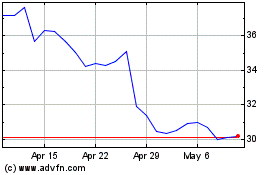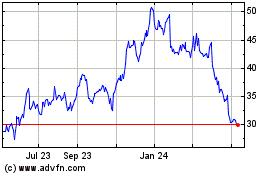Qualcomm Steps Up Apple Feud -- WSJ
September 26 2018 - 3:02AM
Dow Jones News
Chip company alleges iPhone maker shared confidential files with
rival supplier Intel
By Tripp Mickle
This article is being republished as part of our daily
reproduction of WSJ.com articles that also appeared in the U.S.
print edition of The Wall Street Journal (September 26, 2018).
Qualcomm Inc. accused Apple Inc. of funneling proprietary
information about the chip supplier's technology to rival Intel
Corp., broadening a long-running legal battle between two companies
central to the smartphone industry.
Apple engineers used its software and confidential files to help
Intel engineers develop modem chips for iPhones, according to an
amended complaint Qualcomm filed Tuesday in California's Superior
Court in San Diego County.
Qualcomm, which is seeking unspecified damages, provided no
evidence supporting its charges in the filing. It is asking the
court for a jury trial where it said it would present evidence
based in part on discovery it's already conducted.
An Apple spokesman referred to the company's past statement on
Qualcomm's business practices, calling them illegal and harmful to
the smartphone industry.
Intel, which isn't named as a defendant, declined to comment.
Its modem chips were incorporated into iPhones in 2016, marking an
end to a period of Qualcomm exclusivity as a supplier of that
component.
The accusation of intellectual-property theft intensifies the
feud between Apple and Qualcomm and lessens the likelihood of a
settlement between the two in the near future. The longtime
technology partners are locked in legal tussles over patent
royalties and patent infringements in courts ranging from the U.S.
to Germany.
That dispute has upended a partnership that dates back to 2010,
when Qualcomm entered an agreement to begin supplying Apple with
modem chips for iPhones and iPads. Apple first sued Qualcomm in
January 2017 over the modem supplier's practice of collecting
royalties on the entire sales price of an iPhone up to $400.
Qualcomm says it charges a percentage of an entire device
because its patents -- essential to implementing
cellular-communication standards -- relate to cellular devices as a
whole, not just its chips.
Under terms of their previous partnership, Qualcomm said it
agreed to provide Apple with techniques, methods and software to
evaluate the performance of its modems in iPhones. Those agreements
gave a limited number of Apple engineers access to sensitive
information, and Qualcomm said it has evidence showing Apple
provided some of that information to Intel around 2016 -- a time
when it says the iPhone maker was seeking leverage in modem-chip
negotiations.
"Apple has engaged in a yearslong campaign of false promises,
stealth, and subterfuge designed to steal Qualcomm's confidential
information," Qualcomm said in its filing.
The allegations are an amendment to a breach of contract suit
Qualcomm filed last November. In it, Qualcomm accused Apple of
violating an agreement that allows the chip supplier to audit the
iPhone maker's use of its software. Qualcomm also said Apple
engineers had shared some information about its technology with
other Apple engineers working on competitors' chips.
In August, Apple challenged Qualcomm's suit in a filing, saying
that after nine months of discovery the chip maker had failed to
disclose evidence supporting those allegations. It asked the court
to compel Qualcomm to disclose evidence.
Qualcomm's filing Tuesday expands on the chip supplier's prior
claims by directly accusing Apple of using Qualcomm software to
improve Intel's chip performance. It also says Intel engineers
complained to Apple they weren't able to open Qualcomm files
provided by the iPhone maker.
The latest legal volley from Qualcomm lands the same month as
Apple announced new iPhones without Qualcomm modem chips. The
iPhone XS and XS Max released last week rely on modem chips from
Intel, according to iFixit, a site that evaluates the components in
new devices.
The legal fight with Apple has hung over Qualcomm throughout a
difficult period. The company fought off a takeover from Broadcom
Inc. in March. It later abandoned its own planned takeover of NXP
Semiconductors NV because it couldn't secure regulatory approval
from China due to the trade battle with the U.S. Apple has withheld
billions of dollars in payments as the royalty dispute marches
on.
Write to Tripp Mickle at Tripp.Mickle@wsj.com
(END) Dow Jones Newswires
September 26, 2018 02:47 ET (06:47 GMT)
Copyright (c) 2018 Dow Jones & Company, Inc.
Intel (NASDAQ:INTC)
Historical Stock Chart
From Mar 2024 to Apr 2024

Intel (NASDAQ:INTC)
Historical Stock Chart
From Apr 2023 to Apr 2024
